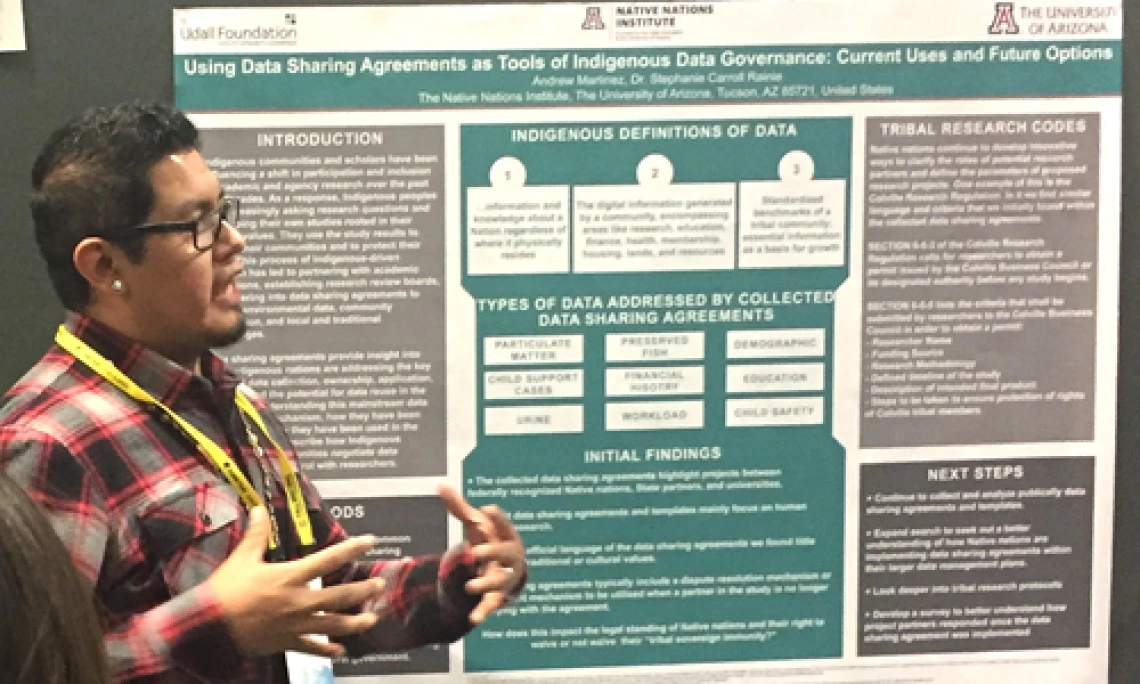NNI Projects Featured at the American Geophysical Union Fall Meeting

Native Nations Institute (NNI) Research Analyst Mary Beth Jäger (Citizen Potawatomi), NNI Research Specialist Andrew Martinez (Salt River Pima-Maricopa Indian Community), and Dominique David-Chavez (Taíno), a doctoral scholar at Colorado State University working with NNI associate director Stephanie Carroll Rainie, presented their work at the American Geophysical Union (AGU) Fall Meeting, Dec 10-14, 2018 in Washington DC. This is the second year that NNI has been invited to engage with AGU. This year’s meeting focused on ethics, diversity, and inclusion.
Jäger represented the work of The Indigenous Foods Knowledges Network (IFKN), a National Science Foundation funded (Award number 1745499) Research Coordination Network that brings together Indigenous peoples from the Arctic and US Southwest who are focused on research and community capacity related to food sovereignty and resilience. The National Science Foundation funds IFKN (National Science Foundation Award Number 1745499). Her presentation focused on how IFKN supports scholars through research and academic innovations. When asked to reflect on her AGU Session, From Either/Or to Yes/and: Increasing Indigenous Participation in Science by Simultaneously Cultivating STEM and Cultural Identities, Jager said, “The presenters demonstrated that Indigenous people can and are cultivating STEM and Cultural Identities at the same time across Indian Country. I think the work featured can be built upon and I’m excited to see how IFKN can contribute. A key component of the discussion is the governance of data and knowledges, which NNI’s work can help strengthen. I’m glad we are part of this conversation.”
Martinez presented a paper co-authored by Stephanie Carroll Rainie and Daniel Ferguson (University of Arizona), “Resilience, Sustainability, and Indigenous Communities: Knowledges in Dialogue for Environmental Research, Assessment, and Planning” and a poster co-authored with Rainie, “Using Data Sharing Agreements as Tools of Indigenous Data Governance: Current Uses and Future Options.” The paper focuses on providing examples of collaborative work in which Indigenous communities led efforts to bring different knowledge systems together in order to support community priorities, values, and sustainability goals. Martinez’s poster presents tribal uses for data sharing agreements and how tribes can utilize data governance mechanisms to protect their community members, resources, and cultures. Indigenous data sovereignty is a growing field and NNI has been on the front edge of this work. By participating in AGU NNI hopes to continue to foster and create relationships with other universities and science entities.
Dominique David-Chavez presented a poster co-authored by Rainie, Ferguson, Sarah LeRoy (University of Arizona), Andrew Curley (University of North Carolina), Travis Lane (Inter Tribal Council of Arizona), and Sheldwin Yazzie (Albuquerque Area Southwest Tribal Epidemiology Center), “Supporting Tribal Data Governance for Community Climate Resilience in the Southwest.” The summit served as a regional forum that drew on Indigenous data sovereignty, identifying current climate resilience activities in Southwest tribal communities and data related needs and opportunities. David-Chavez also presented a poster on her dissertation research, “Strengthening Climate Resilience in the Caribbean Through an Indigenous Community-Based Participatory Research Model.”
Images featuring: Dominique David-Chavez, Mary Beth Jäger, Andrew Martinez
Image credits: Dan Ferguson and Andrew Martinez

